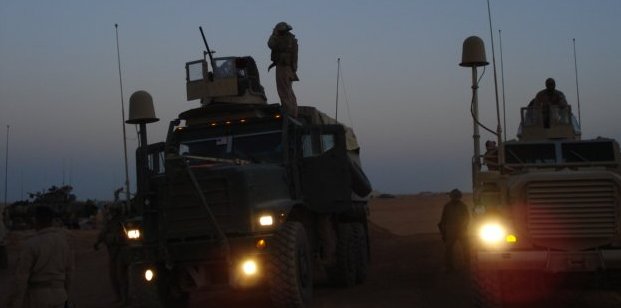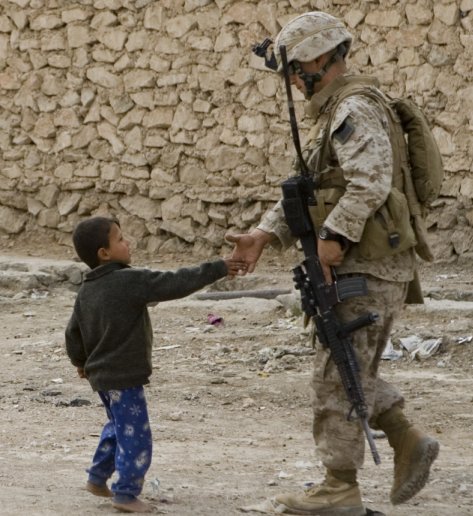Nobody really cares about Iraq anymore. A couple of colleagues and I did a “brown bag” seminar on our experiences there. The few people who showed up did so mostly out of sympathy for me. It was nice of them and I appreciate the support, but Iraq is the past. Media coverage mostly disappeared last year, just about the time things started to improve. Even I have trouble remembering that it was such a big deal not so long ago.

Iraq is no big deal and that is a big deal. It might be useful to consider how that happened. It did not happen because the problem just went away. It happened because we solved it. In a less timid age, we might have said that we won a victory there.
Only a couple years ago, most experts were predicting defeat and not just a little one. The view was that Iraq would collapse into chaos and civil war and that it would take most of the Middle East with it. In fact, the more “realistic” pundits claimed that had happened already. Their sage advice was to get out as quick as possible and leave the place to its unavoidable violent tendencies.
Fortunately, some of us didn’t listen to these hollow men and despite their heckling went on to victory. I feel a little shy about using that term “we,” but I stepped up to do my part too and together we – Coalition forces, brave Iraqis and sometimes even hapless civilians like me – did it.
But is important not to waste what we have accomplished. Given Iraq’s strategic significance, the mission ceased to be a “war of choice” the moment American forces crossed the border in March 2003. Now we have no choice but to see Iraq through to stability.
Many of the same people who called for us to give up a couple of years ago, now feel vindicated that we can withdraw. The logic goes something like this: “Three years ago, we said the U.S. should get out. Now the U.S. is going to get out (mostly). See, we were right.” This is indeed logical – if you ignore the events of the past three years and you forget the effects of time.
Let’s do a historical thought experiment. WWII ended in 1945. Count back three years and you are in 1942. Now imagine a peace activist in 1942 saying that this Hitler guy and the Imperial Japanese Navy are not really very dangerous and we are just making them mad by standing up to them. Three years later he says, “See, I told you so. You didn’t have to waste all that time with D-Day or Iwo Jima.”
I am belaboring this point because I have seen this kind of historical credulity before. The Cold War ended unexpectedly in 1989. No matter how hard you look, you cannot find any expert who unambiguously predicted this outcome even two years in advance. In fact, intellectuals had great fun ridiculing Ronald Reagan for thinking that bringing down the communist empires was possible or even desirable. Many were shocked into humility by the fall of the Berlin Wall, but they quickly recovered their composure. Now it is hard to find anyone who will admit that he did not see it coming. In fact, the new intellectual fashion seems to be that the fall of communism was inevitable and they have gone back to ridiculing Ronald Reagan, calling him a mere bystander at best and perhaps even an impediment. (“We whisper together; are quiet and meaningless as wind in dry grass or rats’ feet over broken glass in our dry cellar.”)
George Santayana said that those who forget history are doomed to repeat it. I don’t know if that all that’s true. What is true is that those who don’t remember history are doomed to be tricked again in similar ways.
There are large forces at work in history and everything that happens has multiple causes. Our choices are bounded. Timing is important. The strategy that achieves wonderful success in one situation may be an ignominious failure in another. But the choices we make DO make a different. The choices we make change the shape of the future. We choose. This is the lesson of history we should never forget.

Looking down from the high summit of time, it seems like events are determined. The more comprehensive a change, the more it seems inevitable. But this is an illusion.
We achieved a victory in Iraq. We stared down a radical insurgency in the heart of the Middle East and beat it back. This is something they said could not be done. We did it. Iraq, despite all its flaws, is now the most democratic country in the Arab world. Someday soon – not today, not tomorrow, but soon – historians will see the spring of 2007 as an inflection point in Middle Eastern history. It will be seen as the time when the old barriers to freedom and development were breached and a new freedom was painfully born and began to grow, fitfully at first, but inexorably They will see it as inevitable and our choices that made it possible will be forgotten.
“The moving finger writes; and having writ moves on. Not all your piety nor all your wit can coax it back to cancel half a line, nor all your tears wash away one word of it.”
